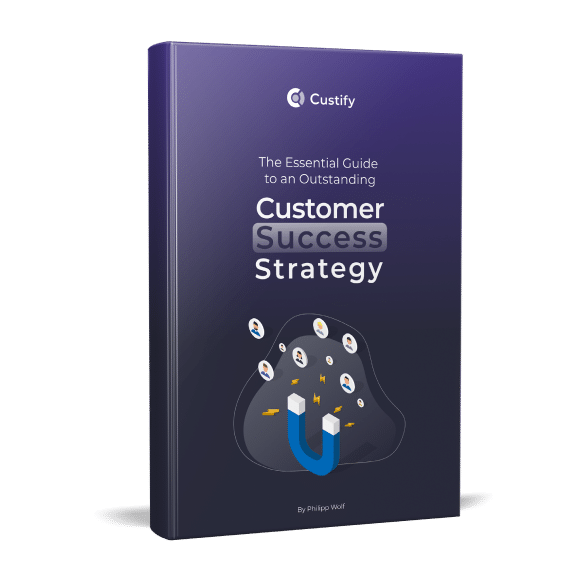As the world moves towards subscription-based software models, customer success job offerings are also on the rise. In fact, in the next 10 to 20 years, it’s predicted Customer Success Manager roles will grow by 560%.
But how do you prepare for a job that up until recently didn’t even exist?
Getting started can be hard as there’s a lot to learn. Whether you’re a new Customer Success Manager, or looking to transition to CS, or even a SaaS business founder looking to implement a CS program, the best place to learn is from others who have gone through it themselves.
The most valuable lessons come from experience. So we asked 14 pros that are leading the way in the industry: how did they decide to pursue a career in Customer Success?
Here’s what they said:
1. You don’t need to know everything from the start
When it comes to Customer Success, a technical background or previous experience in SaaS software administration sure do come in handy. But the most important thing for a CSM is knowing how to develop long-term relationships with customers.
Customer success is different from customer support or account management. So give yourself time to learn everything you don’t know yet about your customers, as well as your product.
For example, Perry Krug, a Customer Success Manager at Couchbase, spent 10 years working with customers in various Sales Engineering roles before he finally switched to a customer success job: “I had long been asking us to form a CS team, so when the organization was ready I was one of the first to raise my hand! I don’t have a background in CS-as-an-industry, but I certainly know what it takes to make our customers successful!”
Dan Lahat, Customer Success Manager at Cobwebs Technologies, also has an inspiring story. He switched to customer success after 13 years in QA.
“My first weeks as a CSM included a coding bootcamp and many emails I wrote to customers which were constantly changed and improved by my manager. As time went by and I proved myself, I was in a place to better understand what was key in my specific role”.
2. Focus on the skills you have, and build those you don’t
Following the previous point, one requirement Customer Success Managers should meet is curiosity. CS reps switch many hats – consultant, support, sales – so it’s important they always seek to improve their skill set.
“My position includes everything from tech support to sales, so I get to use my soft skills like active listening and conflict resolution, which I feel pretty confident about. Occasional technical issues aren’t a problem as well. I have no difficulty reproducing bugs and basic debugging” – Konstantine Kakabadze, Customer Success Manager at HelpCrunch.
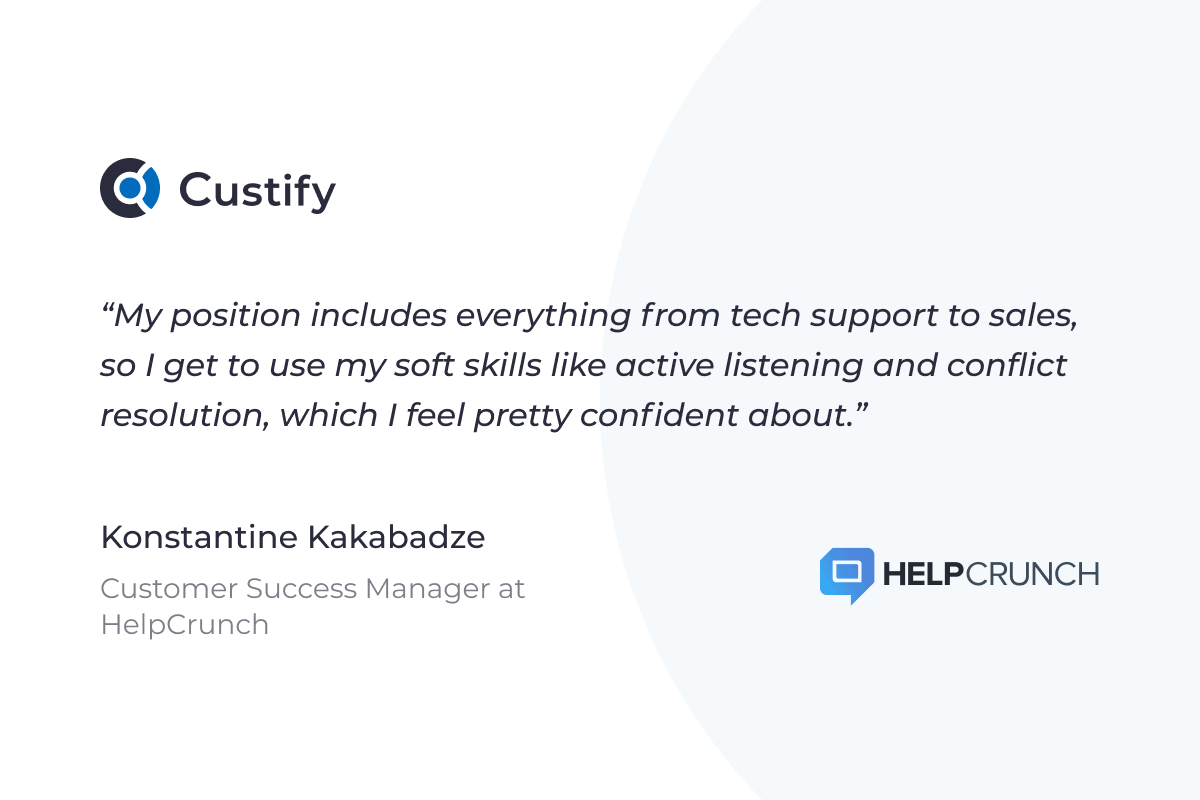
3. Love what you do and do what you love
Think back to when you were a kid and people asked you what you wanted to be when you grew up. Chances are you never said “I want to become a Customer Success Manager”, mostly because this job didn’t exist 20 years ago.
But you probably knew you like working with people, and you had a natural flair for these types of roles. Well, sometimes, that’s all it takes for your career path to change. That was the case for Alice Jacobson, Customer Success Manager at English Blinds.
“I was lucky enough to be part of a company that supported the career development of employees and was willing to invest in training and promote internally. I think that you tend to enjoy work that you’re good at, or maybe become good at work that you enjoy, and for me, getting a positive response from someone is hugely rewarding and helps to keep me upbeat and enthused about what I do.”
4. You need to want to help people
All customers want a great customer experience. But without setting a goal for timely resolutions, you won’t be able to achieve this. On the contrary, customers might get angry and leave.
Verity Dods, Head of Customer Success at Allocate Software, says it best “I was a customer of my company before joining customer success. I had no idea what this was all about, but knew I could ‘help’ more people in that role than within the one in the organization I worked in”.
When you like to go out of your way to help people, you build trust and make long-lasting partnerships that go beyond just selling software.
You can also attract new business opportunities. Sometimes, you don’t need to sell a product (you might not even have a product yet), you need to sell a vision.
Check out what Roland Bavington, Customer Success Executive at Oracle said about what he realized in the middle of a meeting that included a Customer Success professional pitch: “What the customer was super interested in was how we were going to deliver a working system that did what they wanted. This was before I even heard of customer success; I could see how the senior people sat up and listened, and it made me want to find out more.”
Top Customer Success Managers are passionate about developing customer relationships that promote retention and loyalty. They enjoy working closely with customers to ensure they’re satisfied with the services they receive and to improve upon areas of dissatisfaction.
Often, people don’t choose their career – their career chooses them. So a customer success job is always the perfect fit for people who might not have a clear idea of where they want to go, but they know what they’re passionate about and build their careers on top of that.
“Many candidates decide they want to opt for this role because they have good communication skills and are persuasive in their approach. Plus, with customers expecting more personalized experiences over time, this job role has massive growth potential”, says William Taylor, Career Development Manager at VelvetJobs.
5. See the bigger picture
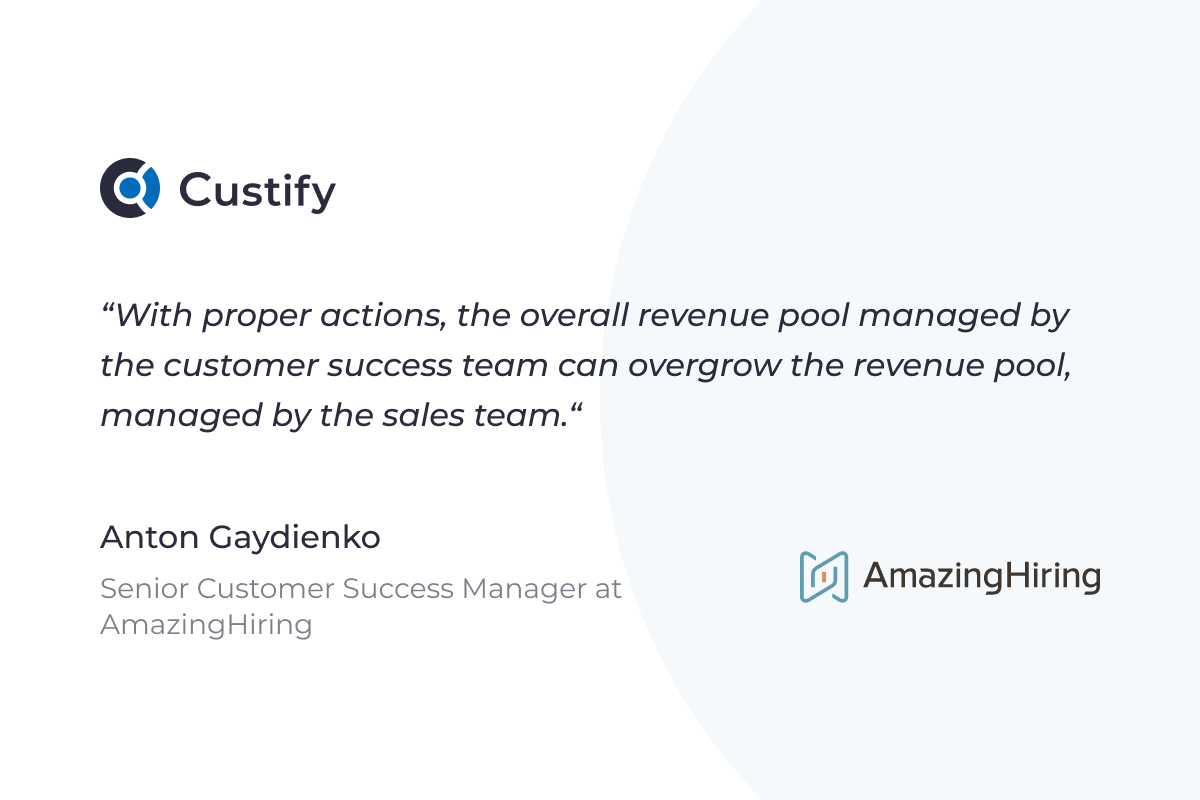
Most companies have a common problem – they’ve gained quite a big portfolio of clients they can (and should) monetize, but they don’t have the resources to do so (both employees and procedures).
Sales / Business Development Managers focus on obtaining new accounts, while Account Managers focus on the operational aspects of working with clients. The missing piece – customer success – is a HUGE opportunity for revenue growth for every company.
“With proper actions, the overall revenue pool managed by the customer success team can overgrow the revenue pool, managed by the sales team. This puts lots of responsibilities on CSMs shoulders, but also gives them lots of opportunities”, – Anton Gaydienko, Senior Customer Success Manager at AmazingHiring.
We’ve come a long way since 2006 when the SaaS business model was first adopted. Back then, companies knew how to sell features and functionality, and engineers knew how to make products.
What they didn’t know was how to manage ongoing customer relationships. Once the initial competition between the old-model, perpetual-licensed on-premise software vendors, and the arising SaaS vendors was resolved (the SaaS vendors won), the truth of the necessary organizational changes began to be realized.
Those who noticed this shift have been quick to capitalize on it, like Mikael Blaisdell, Executive Director at The Customer Success Association did. “I founded the Customer Success Forum on LinkedIn in 2009, and the Customer Success Association in 2012. From just 350 people in 2009, our membership has grown to over 38,000 professionals worldwide”.
In his journey, he’s seen many customer-facing executives taking a different path to their career, towards customer success:
“Some CSMs were Account Managers who realized that more was needed. Others were implementation/onboarding specialists or sales engineers. The key to all of them is their domain expertise and their ability to apply it in a way that increases the sustainable proven value for both customers and the company.”
6. Do what’s best for your business
The Customer Success Manager job title reflects a change in the mindset of SaaS businesses. Instead of focusing on winning the customer, their focus has shifted towards showing customers the path to value.
“I decided to take the role of Customer Success Manager because I was always good at working with people to solve technical problems. The only real difference now is helping more customers at scale”, says Mike Krynski, Customer Success Manager at CATSY.
This isn’t always easy to do as some companies that have results-oriented sales cultures. But it’s definitely worth it.
“The aspect I really enjoy in this role is solving problems and/or delivering the exact requirements to customer’s delight. It really makes my day to see my customers happy with me and our software solution!”, continued Mike.
Lauren Locke-Paddon, VP of Customer Success at VocalVideo thinks that, with the SaaS economy taking off, it became more clear that customer outcomes would pay off in the bottom line by the retention and expansion of customer accounts, as well as the new business opportunities.
“Customer success ties together three of the most important business metrics for many businesses: retention and expansion of customers as well as a huge impact on new business (think about the flywheel that case studies and videos provide for marketing, and how often word-of-mouth can be a massive channel).
Done right, customer success also sits at the center of product, sales, and marketing – a very fun and dynamic place to be.”
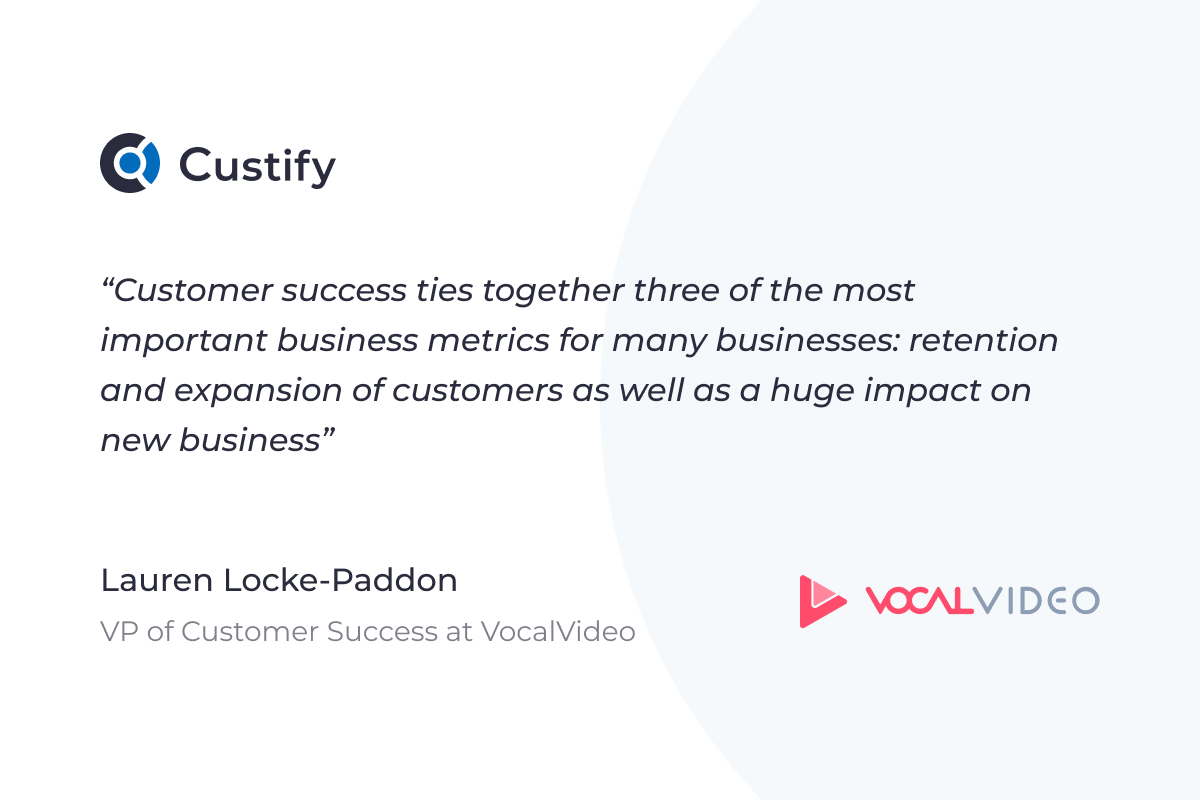
7. Really get to know your audience
Knowing your audience is key to every marketing strategy. Sure, there are many tools out there that can help SaaS businesses pick the brains of their customers. But nothing quite compares to interacting with your customers directly.
“I get to see our platform’s user data and build our onboarding experience, support content, and UX based on real observations of our users in the platform. It allows me to really get to know my audience’s challenges and use a lot of different strategies to help them fall in love with our product and get the most out of their experience”, says Hannah Lindstadt, Content Creator & User Success Specialist at Brainity.
8. You need to love to work with people
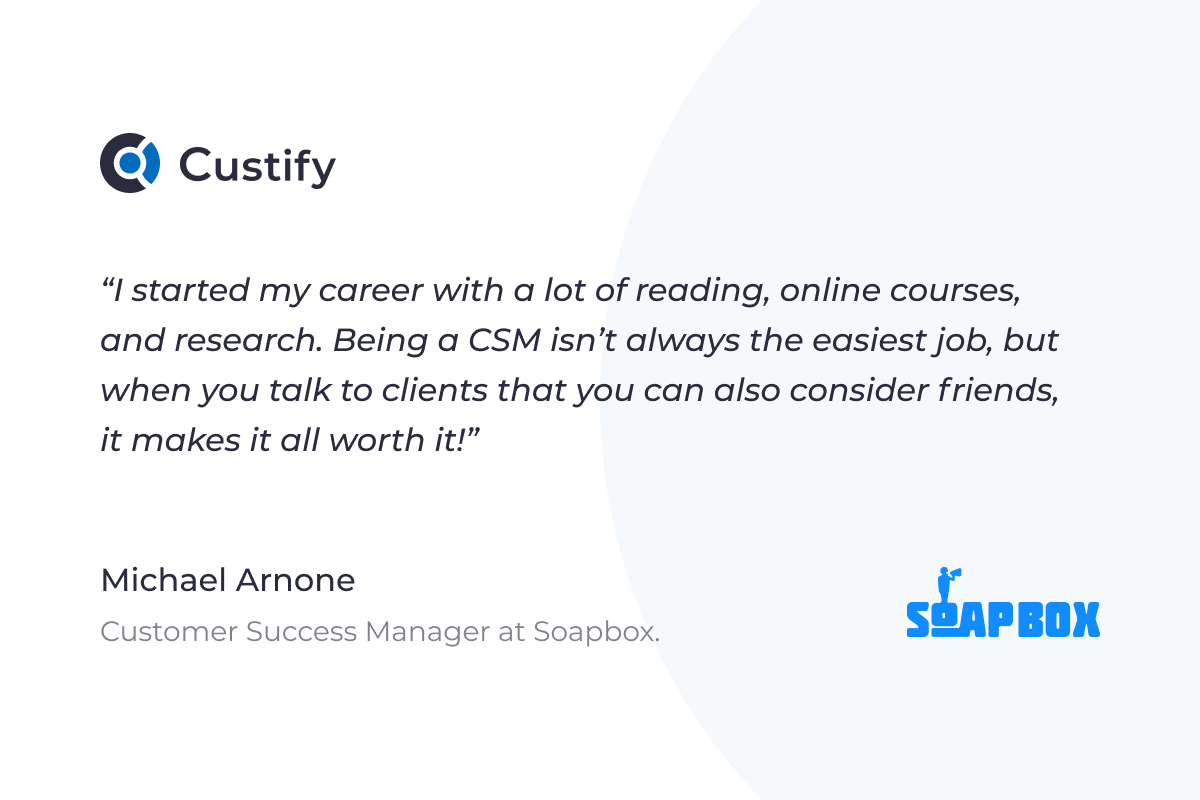
A customer success job is for people who dream of making a career out of building relationships with people around products they’re passionate about.
CSMs should love interacting with customers daily, helping them grow and succeed without any need for cheesy or insincere sales gimmicks.
“Customer Success was a way for me to advance my career where I could continue to make people smile and help them see all the benefits that Soapbox has to offer. I started my career with a lot of reading, online courses, and research. Being a CSM isn’t always the easiest job, but when you talk to clients that you can also consider friends, it makes it all worth it!”, says Michael Arnone, Customer Success Manager at Soapbox.
9. Focus on pain-points above all else
Today, what customers care the most about is receiving an excellent service that exceeds their expectations and is more frictionless than they ever experienced in the past.
Identifying customer pain points and offering solutions can bring many benefits to a SaaS business:
- You can attract new customers who are tired of dealing with the frustrations they’re experiencing with your competitors.
- You can convince previous or one-time customers to come back to your business.
- You’re also more likely to retain the customers you already have.
Vicky Ezell, Client and Operations Manager at mindStart knows that pain points are a critical factor in Customer Success: “Working with startups around the world, it became apparent very quickly that no matter the company or product, they all faced many of the same pain points. Having helped to solve these common issues, I felt well-suited for the role presented to me at mindStart as Client and Operations Manager.”
Harnessing the power of customer success is a fine balancing act. Some SaaS businesses are doing it right, but most are not. And that’s why we’re here – to enable businesses to interact with their customers more easily and to help them become successful.
CS is all about being proactive. But sometimes, CSMs can get overwhelmed and end up being reactive instead. By using customer success software to automate the time-consuming tasks, CSMs can get back on track and focus on what really matters – offering customers value.
Knowing how your customers are using your product and the challenges they encounter in their journey is key to offering real value. Customer success means helping customers that are stuck in any stage of the product lifecycle – during onboarding or at any later stage in the product usage.
Do you want to become that partner who your customers LOVE? Now you have all the tools and knowledge you need.




